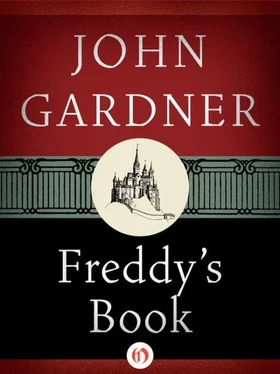Yet the thought of the young man would not leave him. He saw in his mind how his young friend had walked, head thrown forward, mouth sombre, as determined and prepared for disaster as a Jew, walking — almost running — as if rushing toward some encounter he feared but would not duck. Once, arguing some idiotic point of theology, Hans Brask had burst into tears and the young man had seized his trembling hands. It was the only time they’d touched, except, perhaps, for a casual pat on the shoulder, a collision — he remembered it distinctly — in the hallway. Yet the whisper of the priests skirts at the door was slaughtering, his scent unearthly — but enough.
They came out into the light of an open field, a little village in the distance. Peasants were cutting hay, the last of the season. The scent of it was dizzying. Grasshoppers and honeybees were everywhere. It came to Bishop Brask that he had ridden for a long time in silence, not answering Lars-Goren’s question. He said, “I’m sorry. You must forgive me. You asked me something — what was it?”
Lars-Goren rode with an easy comfort that made the bishop suddenly conscious again of the pain in his back and upper thighs. Lars-Goren cast back in his mind, trying to remember. Bishop Brask remembered first.
“Ah yes,” he said, “why is it that I’ve come with you? That was your question.” He thought about it, frowning hard. “I don’t know,” he said at last. He knew for an instant what the truth was — it leaped up in him like a shock of excitement, a remembered nightmare — but then his despair was back, and, wearily, he shook his head.
At Gästrikland, all one heard anywhere was excited talk of the Daljunker. From the emotion he roused, he might have been the Messiah come back in glory. Lars-Goren and the bishop, after conferring together, veered toward the west, into Dalarna. It was evening when they arrived in Kopparberg. The city was in a furor. The Daljunker had arrived sometime this morning, they were told, and would speak to the assembly tonight Lars-Goren and the bishop hurried to join the crowd.
Lars-Goren could not say what he’d expected, exactly — certainly a Dalesman, crude but impressive; otherwise why would the Dalesmen have rallied to his cause in such enthusiastic force? But whatever it was that Lars-Goren had expected, the Daljunker, when he appeared, was a surprise.
He was an elegant young man with golden hair and manners he could only have gotten from a life among aristocrats. If he’d been fostered in Denmark, his speech did not show it. Every slightest gesture was Swedish to the core. His attire was magnificent. King Gustav himself had no such fancy clothes, and even if he had, he could never have worn them with such a casual perfection. In face and figure, he was beautiful — authentically so: he was no womanish imitation, no painted doll, no fop. What he said was not true — Lars-Goren and Bishop Brask knew it. Was he simply a magnificent actor then? If so, he was the finest in the world. Was he mad? If so, he showed not the faintest hint of it.
His voice rang, though he did not seem to shout. The torchlight around him did not seem, tonight, like the torchlight of a stage but simply torchlight. Lars-Goren mused on it so deeply that he almost missed the Daljunker’s words. Surely, Lars-Goren thought — and he had never thought more carefully, more critically than tonight — surely the Daljunker would have the same effect in the middle of the day. His confidence in what he was saying was hypnotic.
The Daljunker cried out, as if in authentic agony, that King Gustav, Sweden’s great hope and the hope of the whole northern world, was dead. Listening, Lars-Goren for a moment believed it and was shocked to the bone. He glanced at Bishop Brask, who very slightly, glumly, shook his head. Lars-Goren stared in amazement at the Daljunker. “He was Sten Sture’s kinsman!” the Daljunker cried. “He fought King Kristian and King Fredrik and Sören Norby and the bishops! He made us proud to be Swedes! It is said that he killed Nils Sture, but that is not true! So brilliantly and cunningly that even the international magnates were fooled, he slipped Nils Sture out of prison, so that here and now he can stand before you all and cry, The king is dead — long live the king!’
“Le roi est mort,” Bishop Brask whispered, not turning his head. “He must have studied in France.”
Now the Daljunker spoke of Sten Sture. His voice betrayed him, cracking, though he struggled for control. Lars-Goren found himself mentally backing off in a way that obscurely frightened him. But however Lars-Goren backed off from it, there could be no doubt of the Daljunker’s sincerity. His tears, his voice, were not an actor’s effects. He meant and believed every word he said, his tears were no less honest, Lars-Goren would have sworn, than the tears of Gustav Vasa when the bodies burned on Södermalm hill. Yet the whole thing was a lie — absolutely a lie, though conceivably the handsome young man did not know it. The Daljunker, speaking of Sten Sture, who he claimed was his father, was now weeping openly, no longer struggling against the force of his emotion. The Dalesmen all around Lars-Goren and the bishop wept with him. “Madness!” Lars-Goren thought. But the word was not enough.
Lars-Goren caught himself up sternly. “Suppose I am mistaken,” he said to himself. “Suppose Gustav Vasa is dead and has been dead for weeks”—so the Daljunker had claimed—“and I am mistaken. Suppose this is truly, this Daljunker, the king of the Swedes.”
That instant Bishop Brask seized his elbow and said, “Enough. Let’s go!” Lars-Goren studied the terrible weariness in the bishops eyes and, almost unaware that he was doing it, hurled up a prayer.
Fool, thought Bishop Brask, stupid moron fool! His rage was beyond words as he forced Lars-Goren toward the back of the crowd, guiding him ferociously by the elbow. He might have laughed, if he could summon up the energy. Nevertheless, when they had escaped the outermost rim of the crowd, he for some reason did not let go of Lars-Goren’s elbow but, instead, hung on as if Lars-Goren were dragging him back out of Dalarna, north toward Hälsingland, toward safety and hope, as in fact he was.
4.
THE DEVIL TOOK THE FORM of a fly and sat on the mantel in the firelit hall. He felt the threat very strongly here, though it seemed to make no sense. “Perhaps,” he said to himself, rubbing his front feet together in frantic agitation, “perhaps it’s the form of the fly that makes me feel this way. A fly’s a very vulnerable creature. Perhaps it’s only that.” As an experiment, he flew up into the darkest corner of the room and transformed himself to a spider. If anything, the feeling of foreboding grew stronger than before. He looked down, baffled, at Lars-Goren, his family, and their guest, sitting close to the fireplace, their outlines blurring against the white, swirling fire.
There was nothing he did not know concerning the mission King Gustav had assigned to Lars-Goren and the bishop; not a detail he did not know about their long trip north. He had been startled to laughter, hearing King Gustav charge them with his removal, and he was no less inclined to laugh now. Yet his sense of danger was as sharp as the smell of woodsmoke all around him.
He lowered himself on a strand of gossamer to listen more carefully to their talk. As he listened he began to feel not only foreboding but anger. Like all human talk, it was unimportant, senseless, and took forever to get said. Their talk was so trivial he could barely keep his mind on it from sentence to sentence; and as his impatience grew by bounds, so his curious sense of foreboding grew. It would be the death of him, he thought, this inability to concentrate on stupidity not worthy of his attention. Yet surely no one, not even God himself, could keep his mind fixed on this foolish, meandering conversation in which the words of a child had the selfsame importance as the words of Lars-Goren or his wife or Bishop Brask. Still in the form of a spider, he lowered himself to the flagstones and ran nearer, scampered to within half a foot of Lars-Goren’s wife’s shoe.
Читать дальше











